Safety advice released in the wake of the Grenfell Tower Fire that has stood since January 2020, and has led to hundreds of low-rise buildings being deemed unsafe, is to be withdrawn by Christmas according to Michael Gove.
 The Secretary of State for Levelling Up, Housing and Communities, told MPs the Government would be revoking previous advice for buildings owners to check cladding systems on all blocks, regardless of their height – advice which left many leaseholders unable to sell their homes.
The Secretary of State for Levelling Up, Housing and Communities, told MPs the Government would be revoking previous advice for buildings owners to check cladding systems on all blocks, regardless of their height – advice which left many leaseholders unable to sell their homes.
Prior to this advice note in January 2020, checks had only been required on buildings over 18m tall where the difficulty evacuating from a fire created a risk to life. Now, Gove says he intends to withdraw the advice note.
Gove told MPs: “The Government has a responsibility to make buildings safe, but we also have a responsibility to relieve some of the obligations faced by leaseholders at the moment who are innocent parties in this and in many circumstances are being asked to pay disproportionate sums when there are individuals in business, some of them still in business, who are guilty men and women.”
In evidence presented to the Commons select committee on levelling up, housing and communities, Gove also admitted that the government ‘made mistakes’ in the lead up to Grenfell.
Gove acknowledged: “We collectively, the department, some on local government, others in the private sector, failed people at Grenfell.”
The government had initially promised a £1bn Building Safety Fund, later increased to £5bn, to remove the flammable cladding on high-rise buildings, but MPs later estimated the cost would be £15bn. In addition, buildings between 11 meters and 18 meters were not covered by the Building Safety Fund, leading to ministers announcing a loan scheme where leaseholders would repay up to £50 a month.
Gove told the House of Commons housing committee that he would “pause” plans for the loans, claiming: “I am still unhappy with the principle of leaseholders having to pay at all, no matter how effective a scheme might be in capping their costs or not hitting them too hard at any one time.
“My question is, why do they have to pay at all?”
The Housing Secretary also criticised building developers, stating there were questions from the Grenfell inquiry as to whether they had knowingly put “cost reduction before safety.”
This article was originally published on IFSEC Global.
Safety & Health Podcast
In this episode, we drop in to a recent FIREX webinar, which looked at the legislative and systemic changes required in fire safety, and the wider building sector, to ensure buildings are made safer for occupants.
Fire Safety in 2023 eBook
SHP's sister site, IFSEC Insider has released its annual Fire Safety Report for 2023, keeping you up to date with the biggest news and prosecution stories from around the industry.
Chapters include important updates such as the Fire Safety (England) Regulations 2022 and an overview of the new British Standard for the digital management of fire safety information.
Plus, explore the growing risks of lithium-ion battery fires and hear from experts in disability evacuation and social housing.

 The Secretary of State for
The Secretary of State for 
remind me how much was given to party donators and family members for T&T…£37Bn was it? Can find it when they want to eh.